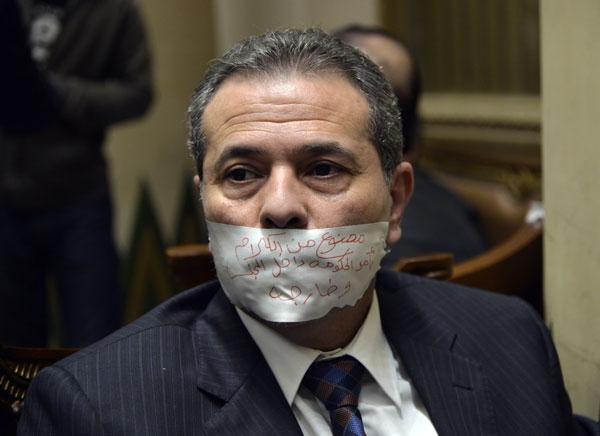You are here
Egypt’s first parliament in 3 years off to chaotic start
By AP - Jan 14,2016 - Last updated at Jan 14,2016

Tawfiq Okasha, a pro-government TV anchorman who was elected to parliament, sits in an anteroom after he taped his mouth shut in protest at not being given the floor during a parliamentary session, in Cairo, Egypt, on Tuesday (AP photo)
CAIRO — Egypt's first parliament in three years is off to a rocky start, with flamboyant displays of support for the president and general rowdiness leading to a cut-off of live coverage after just two sessions and drawing ridicule even from pro-government media.
The 596-seat assembly is packed with supporters of President Abdel Fattah Al Sisi, who led the military's overthrow of an elected Islamist president in 2013.
At Sunday's inaugural session, newly elected Speaker Ali Abdel Al got a standing ovation after describing Sisi as the "leader president" and the "leader of the march". The next day, when the speaker arrived late, he explained his tardiness by saying he was on the phone with Sisi, "who asked me to pass along his greetings”, drawing another round of applause.
The chamber, which in theory is supposed to serve as a check on presidential power, has also sent Sisi a formal "message of support", according to lawmakers Ibrahim Abdel Nazeer and Ahmed Nabil, who said: "It's only natural to thank someone who has done you a great service."
The adoration proved too much even for some in Egypt's ardently pro-government media. "Gentlemen, you are there to monitor the president, not to love him," prominent TV talk show host Amr Adeeb counselled on the air.
Lawmakers during Sunday’s session spoke on their mobile phones or took selfies. Some waved to the TV cameras or held red, white and black Egyptian flags. One lawmaker, apparently unaware his microphone was on, was heard using expletives to complain about other legislators.
The media also complained about how some lawmakers lack mastery of Arabic grammar, when the two elected speaker deputies — Mahmoud El Shereef and Suleiman Wahdan — had to start over six times and twice, respectively, when they recited short Quranic verses while addressing the house.
On Tuesday, lawmaker Tawfiq Okasha, a popular, pro-Sisi TV anchorman, taped his mouth shut to protest what he said was the repeated denial of his requests to address the house. “Banned by government orders from speaking inside or outside the house,” he wrote on the tape.
The legislature is Egypt’s first since June 2012, when a court dissolved an Islamist-led body shortly before Mohamed Morsi, of the Muslim Brotherhood, was elected president.
The new assembly, elected last year in a vote with low turnout of around 30 per cent, has been billed as the final stage in Egypt’s return to democracy following Morsi’s overthrow. But the Brotherhood, which won every election following the 2011 uprising that toppled longtime authoritarian ruler Hosni Mubarak, is now outlawed as a terrorist group. Thousands of Islamists and hundreds of secular dissidents have been jailed, and a 2013 decree has virtually outlawed street demonstrations.
The Egyptian media has remained staunchly pro-Sisi throughout the crackdown, but seems to have already turned on the parliament.
“The parliament of chaos and confusion”, read the front page headline of the Wednesday edition of the Youm 7 daily. On Monday, the red banner headline of another independent daily, Al Masry Al Youm, said: “A comic start for the House of Representatives.”
A hurried vote by a show of hands late Monday night ended live coverage of the assembly. Speaker Abdel Al described it as a temporary measure to speed up the review of some 300 decrees issued by Sisi and his predecessor, interim president Adly Mansour.
Failure to review and adopt the decrees — which include the ban on street demonstrations not sanctioned by authorities and a terror law that curbs press freedom and grants the police wide powers — would cause them to lapse.
Egypt’s constitution, adopted in 2014 and seen as the country’s most liberal, prescribed that parliamentary sessions be held in public, but lawmakers who supported the ban and the house’s secretariat said the media’s presence in sessions meets the charter’s requirement.
“It’s a disgusting acknowledgment of the institutional, genetic... malaise that has gripped the house from the start,” political commentator Ibrahim Issa said about the ban on live coverage in Wednesday’s edition of Al Maqal daily.
Related Articles
CAIRO — Egypt's first legislature in more than three years, a 596-seat chamber packed with supporters of President Abdel Fattah Al Sisi, hel
QENA, Egypt — There is really only one possible outcome to Egypt's much-delayed parliamentary election when people begin voting later this m
CAIRO — Egypt's electoral commission said on Wednesday that candidates on an electoral list loyal to President Abdel Fattah Al Sisi won over
















